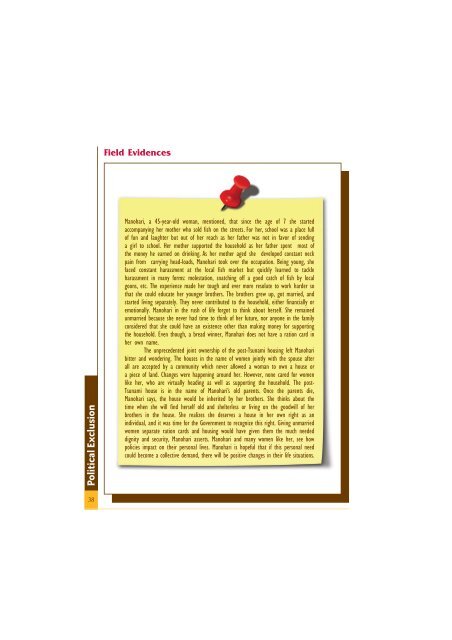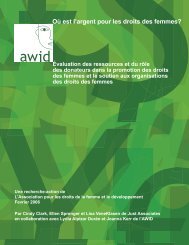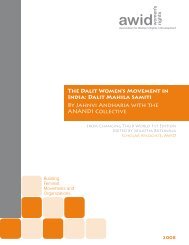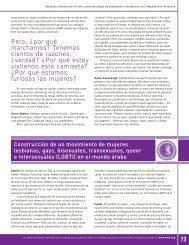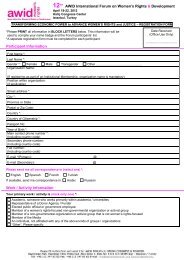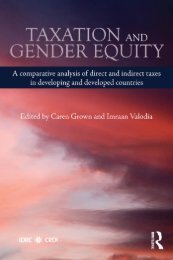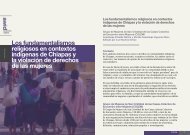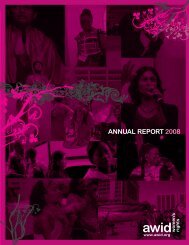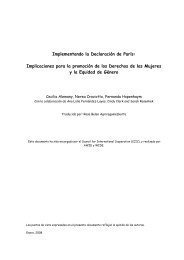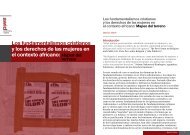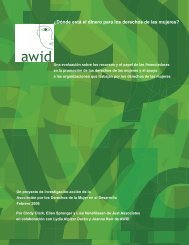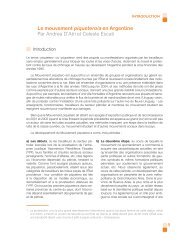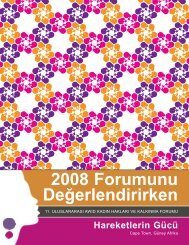Gender Sensitive Disaster Management : A Toolkit for ... - Eldis
Gender Sensitive Disaster Management : A Toolkit for ... - Eldis
Gender Sensitive Disaster Management : A Toolkit for ... - Eldis
You also want an ePaper? Increase the reach of your titles
YUMPU automatically turns print PDFs into web optimized ePapers that Google loves.
Field Evidences<br />
Political Exclusion<br />
Manohari, a 45-year-old woman, mentioned, that since the age of 7 she started<br />
accompanying her mother who sold fish on the streets. For her, school was a place full<br />
of fun and laughter but out of her reach as her father was not in favor of sending<br />
a girl to school. Her mother supported the household as her father spent most of<br />
the money he earned on drinking. As her mother aged she developed constant neck<br />
pain from carrying head-loads, Manohari took over the occupation. Being young, she<br />
faced constant harassment at the local fish market but quickly learned to tackle<br />
harassment in many <strong>for</strong>ms: molestation, snatching off a good catch of fish by local<br />
goons, etc. The experience made her tough and ever more resolute to work harder so<br />
that she could educate her younger brothers. The brothers grew up, got married, and<br />
started living separately. They never contributed to the household, either financially or<br />
emotionally. Manohari in the rush of life <strong>for</strong>got to think about herself. She remained<br />
unmarried because she never had time to think of her future, nor anyone in the family<br />
considered that she could have an existence other than making money <strong>for</strong> supporting<br />
the household. Even though, a bread winner, Manohari does not have a ration card in<br />
her own name.<br />
The unprecedented joint ownership of the post-Tsunami housing left Manohari<br />
bitter and wondering. The houses in the name of women jointly with the spouse after<br />
all are accepted by a community which never allowed a woman to own a house or<br />
a piece of land. Changes were happening around her. However, none cared <strong>for</strong> women<br />
like her, who are virtually heading as well as supporting the household. The post-<br />
Tsunami house is in the name of Manohari’s old parents. Once the parents die,<br />
Manohari says, the house would be inherited by her brothers. She thinks about the<br />
time when she will find herself old and shelterless or living on the goodwill of her<br />
brothers in the house. She realizes she deserves a house in her own right as an<br />
individual, and it was time <strong>for</strong> the Government to recognize this right. Giving unmarried<br />
women separate ration cards and housing would have given them the much needed<br />
dignity and security, Manohari asserts. Manohari and many women like her, see how<br />
policies impact on their personal lives. Manohari is hopeful that if this personal need<br />
could become a collective demand, there will be positive changes in their life situations.<br />
38


